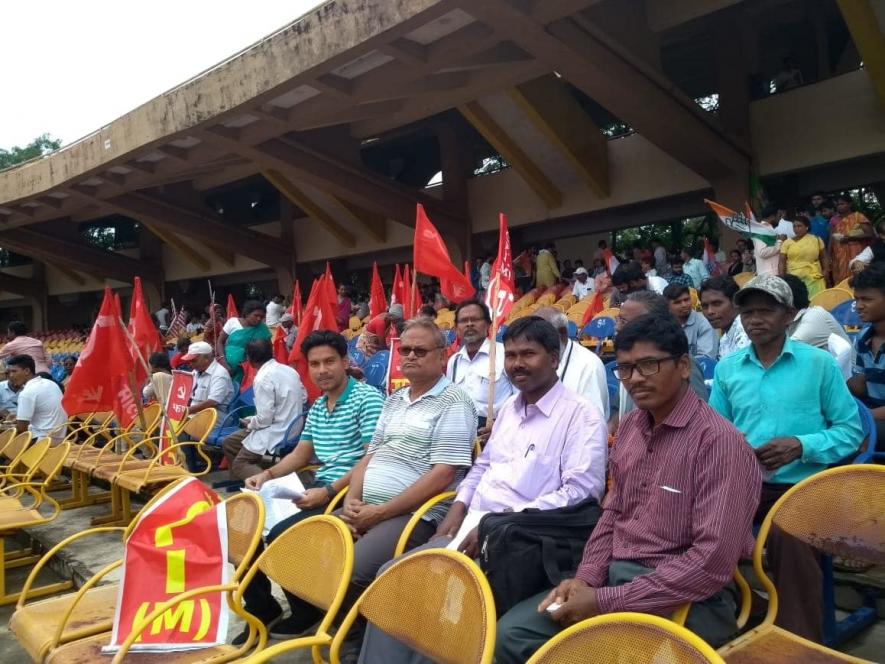Unrest in Jharkhand Against ‘Kaala Kanoon’ or New Land Law

Jharkhand is embroiled in an unrest in almost all the corners of the state. A series of protests have begun and many more are in line as the President gave his assent to Right to Fair Compensation and Transparency in Land Acquisition, Rehabilitation and Resettlement (Jharkhand Amendment) Act, 2017. On July 5, a state-wide bandh was observed after a call given by opposition parties demanding the withdrawal of amendment act, which they termed as “Kaala Kanoon”. Reportedly, more than 19,000 bandh supporters were detained under preventive sections by the police.
The Jharkhand assembly with BJP in power had passed the amendment bill in August last year which essentially takes away the progressive provisions of Land Acquisition Act, 2013. Earlier to this, another two land laws – the Chotanagpur Tenancy Act (CNT) and the Santhal Parghana Tenancy Act (SPT) were amended by the state government. While this attracted mass agitations from the people, tribals, in particular, Governor Droupadi Murmu withheld her assent and sent back the two amendment bills back to the assembly for reconsideration.
On the other side, Chief Minister Raghubar Das has been pushing various projects his government signed with Indian and foreign industrialists during Momentum Jharkhand Investors' Summit 2017 held in February 2017. The government has also announced to conduct another such summit in November this year welcoming private players to start massive companies in the mineral-rich state.
The closer look at the changes brought in with the new law and those intended with the amendments in CNT and SPT would make the BJP government’s plan clear to handover huge tracks of land to industries.
While the Land Acquisition Act, 2013, mandates the conducting of social impact assessment (SIA) and taking consent of the affected people, the Jharkhand Land law can now avoid these procedures. That is for various government projects including schools, colleges, universities, hospitals, panchayat buildings, Anganwadi centres, rail, road, waterways, electrification projects, irrigation projects, housing for the economically weaker section, water supply, pipelines, transmission and other government buildings conducting SIA was ruled out and affected people’s consent is made only for “advisory” purposes.
Chotanagpur Tenancy Act (CTA) and Santhal Parghana Tenancy Act (SPT)
The state government amended three sections and abolished one sub-section of the CTA and one section in SPT was amended. Under these two laws, the government amended provisions that take away the tribal land rights related to use of tribal land and transfer of tribal land.
However, of the total 24 districts, as 13 districts and three blocks in two other districts in Jharkhand are covered under Schedule V of the Indian constitution, and the governor is the custodian of tribal rights mentioned under this Schedule, CTA and SPT there were withheld. Whereas, outside Schedule V, the new law would take away tribal rights.
Under CNT and SPT Acts, tribal land cannot be transferred or sold to non-tribals. Alongside, tribal land use from other than agricultural and allied activities is also barred.
Opposition parties – Jharkhand Mukti Morcha (JMM), Congress and Left Parties have come together demanding the government to roll back the new law. After a joint meeting of the parties, the leaders threatened that they will disrupt the monsoon assembly sessions if the government does not consider their common demand.
“We are ready for debate but first the government will have to withdraw the Kala Kanoon. The government behaved like a goon and passed it through voice vote without a debate. We will not give into such arm-twisting measures,” Hemant Soren of JMM was quoted as saying.
Also Read: 19,000 People Detained in Jharkhand During Protest On Land Bill
Get the latest reports & analysis with people's perspective on Protests, movements & deep analytical videos, discussions of the current affairs in your Telegram app. Subscribe to NewsClick's Telegram channel & get Real-Time updates on stories, as they get published on our website.
















